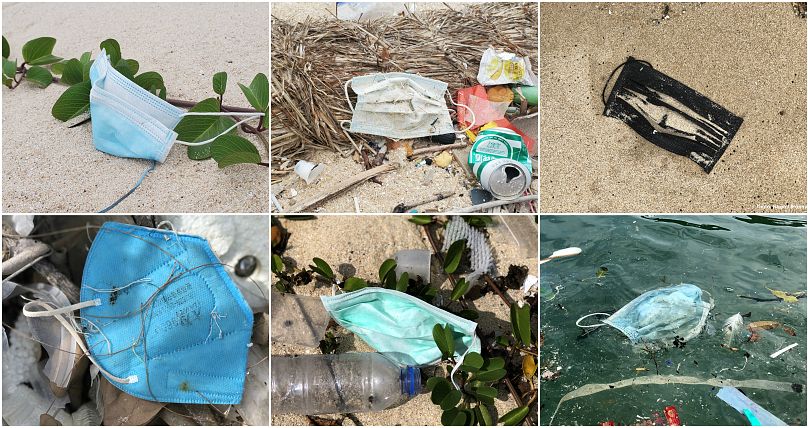While no-one is arguing PPE is not urgently necessary, will one of the legacies of the COVID-19 pandemic be more plastic in our oceans?
COVID-19 has sparked a global arms race for personal protective equipment (PPE) as governments scramble to protect frontline workers.
 ADVERTISEMENT
ADVERTISEMENT
 ADVERTISEMENT
ADVERTISEMENT
But while no-one disputes the current urgency, campaigners are concerned it could worsen another epidemic: plastic pollution.
The UN estimates that 13 million tons of plastic are dumped in the sea each year and that half of the plastic produced globally is for single-use items.
In the Mediterranean, 570,000 tons of plastic are dumped each year, the equivalent of 33,800 plastic bottles every minute, according to WWF.
Italy, during its lifting of lockdown phase, will need 1 billion masks and half a billion gloves per month, according to estimates from the Polytechnic of Turin.
According to a WWF report, "if just 1% of the masks were disposed of incorrectly and dispersed in nature, this would result in as many as 10 million masks per month polluting the environment."
"Considering that the weight of each mask is about 4 grams, this would result in the dispersion of more than 40 thousand kilograms of plastic in nature," the report stipulated.
Much of the PPE being used to protect health workers — like gloves, face masks and gowns — is used once before being thrown away.
This is the case despite there being no scientific evidence that single-use plastics are better than reusable ones, said Kevin Stairs, policy director on chemicals and pollution at Greenpeace.
"When reusing a PPE, we disinfect it. With single-use products, the item is fugitive, escapes the system and can carry the Sars-CoV-2 virus for days on its surface."
Is the circular economy the answer?
"The litter in the sea is generated by the way we dispose of PPEs and plastic in general, not by the use itself," said Richard Thompson, professor of marine biology at the University of Plymouth, who first coined the term "microplastics" in 2004.
"[Governments] are asking every citizen to walk with a mask on, but this does not have to create littering."
"Given the crisis and the immense pressure we are facing at the moment, we should not delay giving everyone PPEs now.
"But, at the same time, if those products are used in the streets, we have to advise people on how to dispose of them."
Thompson argues designing products properly in the first place could help to control the amount of litter in the ocean. This philosophy is the bedrock of the circular economy, which seeks to create items that are easier to be recycled.
Take for example face masks imported from China. Experts say they are made of multiple layers of different materials or polymers. This complexity makes it much harder to recycle such items.
"Countries should try to develop products made of the same polymer, that we can trace and collect in sealed disposable bins, where they can be disinfected and recycled," said Claudia Brunori, a chemist from the Italian government agency for new technologies, energy and sustainable economic development (ENEA).
This is happening on a small scale at the local level where NGOs, institutions and researchers have created reusable PPE, where the mask structure is retained and only the filter is thrown away.
Mike Bilodeau, PlasticOceans regional director for Europe, says instead of importing PPE, it should be made locally and done in such a way that the plastic elements can be recycled and reused.
Is the plastics industry seizing the moment?
The EU introduced a set of rules to tackle marine litter last year - its single-use plastics directive must be made into law at the national level this year.
It included a ban on common single-use plastics like cotton bud sticks, cutlery and straws. Medical masks and gloves are not covered by the legislation.
The European Plastics Converters, a trade association, has already called for the EU legislation to be put back a year because of COVID-19.
Brussels, however, rejected the bid.
Nevertheless, there is evidence of a return to single-use plastic cups amid COVID-19 hygiene concerns, including at Starbucks where reusable mugs have been banned.
Are biodegradable plastics the answer?
The European Commission is developing standards for biodegradable plastics, but even if PPE was made from such materials it wouldn't be a silver bullet for marine pollution, it's been claimed.
"Bio-degradable plastic solutions on their own are not the answer to reducing marine litter," said Virginia Janssens, managing director of PlasticsEurope, an association representing plastics manufacturers.
"The most important element is that PPE and all waste needs to be disposed of properly, according to the authorities’ guidelines."
Professor Thompson said: "Degradation rates depend on many different factors. It depends on the type of polymer used, but in deep seas - where it is cold and dark - will be different from a beach.
"A recent study on biodegradable plastic exposed to different environments showed us that some items disappeared quickly, while you could still shop in some of these bags after four years in the sea. By the time they get to the sea, it's too late."











